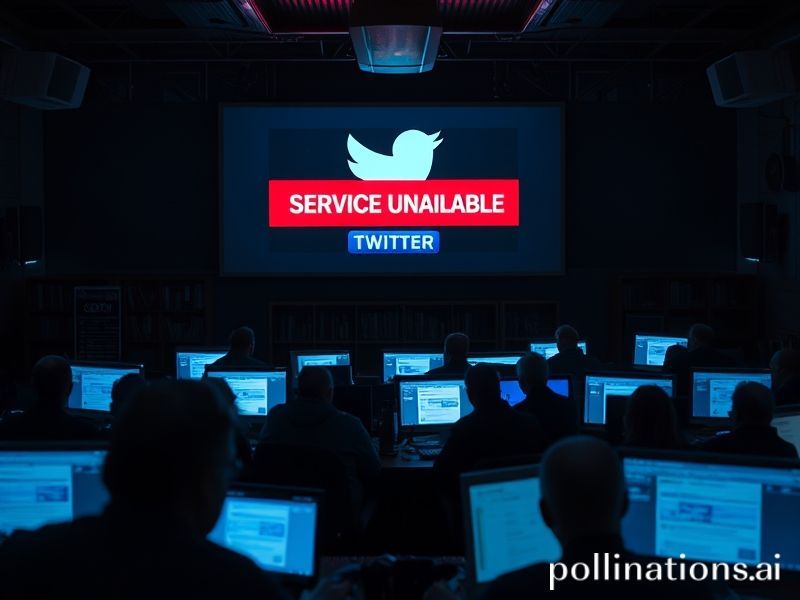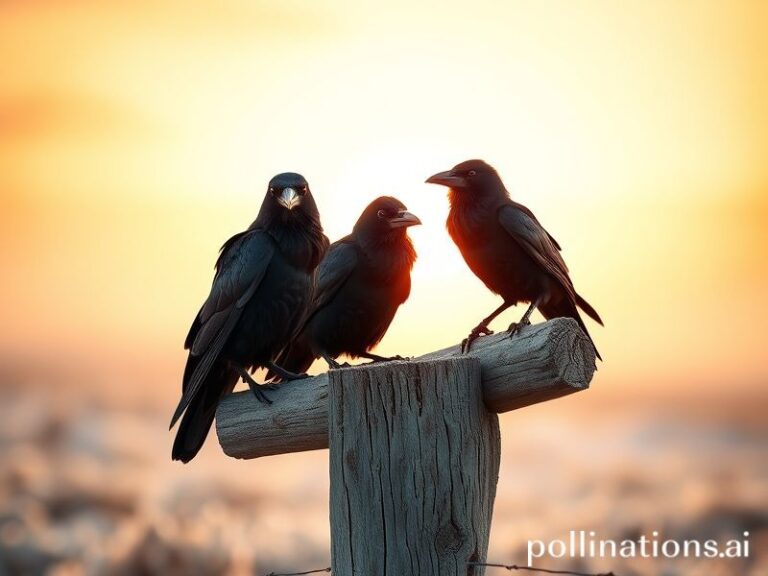twitter down
Twitter Down: Planet Earth Holds Breath, Discovers Oxygen Still Works
By Our Man in the Ether
When the blue bird finally keeled over at 03:47 UTC, the silence was so complete you could almost hear the world’s influencers hyperventilating into ring lights. From Lagos to Lisbon, Seoul to São Paulo, the sudden absence of 280-character hot takes revealed two universal truths: (1) humanity has outsourced its collective inner monologue to a single micro-blogging platform, and (2) we are all, in fact, capable of staring into space without live-tweeting it.
Global stock indices flickered, not because traders suddenly developed impulse control, but because the algos had nothing to scrape. High-frequency bots, accustomed to parsing the emotional incontinence of 450 million users, began buying and selling soy futures based on the last cached tweet from a Kazakhstani goat meme account. The Chicago Mercantile Exchange briefly considered opening a “panic index” derived from TikTok dance frequency, then remembered Congress still thinks an API is a new kind of beer.
In Brussels, EU regulators uncorked warm prosecco: with the platform dark, disinformation took the night off. Russian troll farms, suddenly robbed of their favorite megaphone, were last seen playing Mafia in an empty office park outside St. Petersburg. Meanwhile, Chinese state media issued a 400-word editorial praising “the calm of an unplugged society,” which was immediately screenshotted and posted to Weibo—where, ironically, the servers hummed along happily.
Across the Atlantic, the White House Situation Room convened an emergency Zoom that nobody could livetweet, forcing aides to rediscover the lost art of taking notes on paper. Asked whether the outage constituted a national security threat, the Press Secretary replied that classified information “looks weird without a ratio,” then stared wistfully at a wall socket. By happy coincidence, the President’s 2 a.m. rage tweet about Icelandic fishing tariffs remained forever unborn, sparing Reykjavik the customary diplomatic migraine.
Down in the Global South, Nairobi’s #KOT—Kenya’s notoriously ferocious Twitter battalion—spilled into actual cafés, trading barbs over lukewarm chai instead of thermonuclear ratios. Street vendors reported record sales of samosas, proof that offline beef can still be deep-fried and profitable. In neighboring Uganda, the tax on social media use suddenly looked less like authoritarian overreach and more like prophetic fiscal planning; President Museveni was seen chuckling into a mirrored aviator lens.
Tokyo salarymen, freed from the tyranny of trending hashtags, rediscovered the ancient ritual of after-work karaoke. Without the instant feedback loop of viral clips, off-key renditions of “Bohemian Rhapsody” stayed blessingly local. Over in Mumbai, Bollywood PR teams scheduled actual press conferences—rooms filled with humans, microphones, and the faint smell of desperation—an experience last endured sometime around 2011.
Of course, the outage couldn’t last; Silicon Valley’s business model depends on monetizing every fleeting thought before it reaches the cerebellum. After exactly 173 minutes, the bird lurched back to life, sporting a pixelated hangover and a Terms of Service update nobody will read. Within seconds, the timeline resumed its usual programming: geopolitical brinkmanship, crypto scams, and a cat wearing sunglasses captioned “mood.” The brief global lull was memory-holed faster than you can say “algorithmic amplification.”
Still, for one small sliver of a Wednesday, the planet experienced what anthropologists might someday call “the Great Pause.” No wars were declared, no elections overturned, no brands ratioed into oblivion. We merely sat there, breathing unposted air, discovering that silence doesn’t automatically equal doom. Then someone tweeted “first,” and the spell broke.
Conclusion
Twitter’s temporary demise proved, if nothing else, that civilization does not actually collapse when the timeline stalls; it just shuffles into the nearest bar and orders a round of awkward eye contact. The outage was a planetary stress test nobody asked for and everyone quietly failed: within three hours we were back to doomscrolling, now with the added adrenaline of near-death experience. The takeaway? The world can live without Twitter, but living without the drama it feeds us is apparently too big an ask. Until the next outage—scheduled or accidental—keep your hot takes warm and your charger handy. The bird may be fragile, but our addiction is indestructible.







